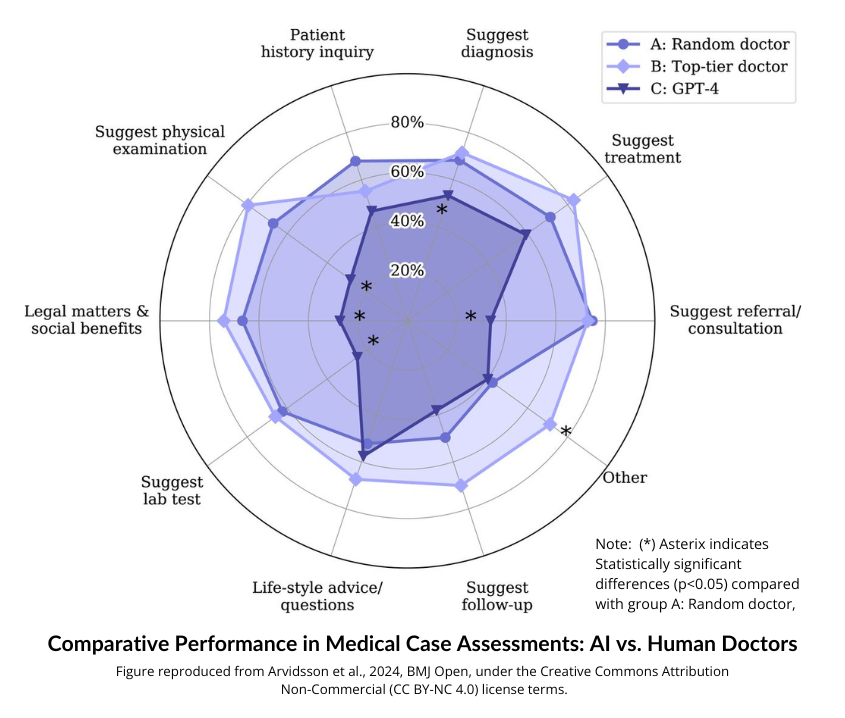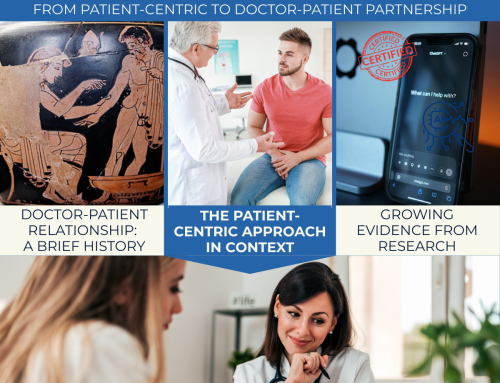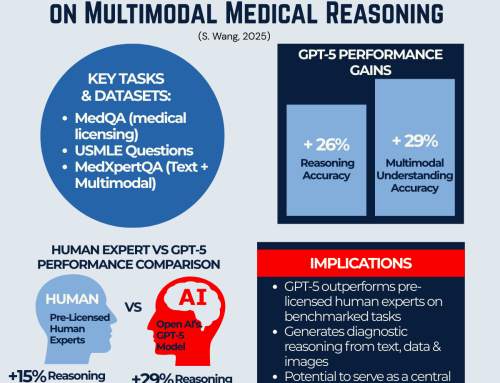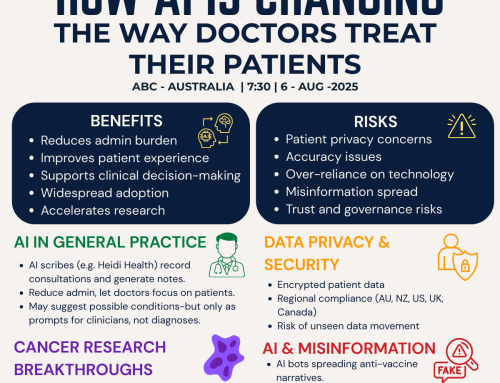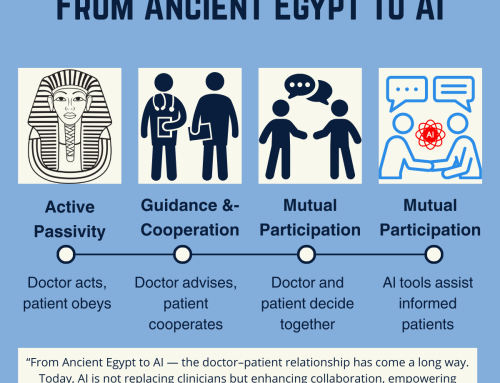Embracing AI in Healthcare: Insights from a Study on ChatGPT and Medical Decision-Making
Integrating artificial intelligence (AI) into healthcare has been met with excitement and scepticism. A recent study published in BMJ Open sheds light on AI’s capabilities in the medical field, particularly examining how ChatGPT (GPT-4), developed by OpenAI, measures up against human doctors in handling complex cases from the Swedish family medicine specialist examination. This study is pivotal for care providers and consumers alike, offering a glimpse into the future of AI in healthcare. In the sections below, we share what we learned from the paper and detail key takeaways for care providers and care consumers and what to expect in the future.
Key Takeaways for Care Providers
- Understanding AI’s Capabilities and Limitations: The study underscores that while AI can assist in managing and diagnosing certain conditions, it currently does not match human doctors’ expertise and comprehensive decision-making ability. Medical professionals should view AI tools like ChatGPT as supplements to their practice—tools that can provide quick information retrieval or suggest possible diagnoses that need further human verification.
- Enhanced Decision Support: AI’s ability to quickly process vast amounts of medical literature and patient data can be invaluable for care providers. This can lead to more informed decision-making, especially in complex cases requiring nuanced understanding and integrating multiple data points.
- Training and Continuous Learning: The study’s findings can be incorporated into medical training programs to educate upcoming healthcare professionals on AI’s potential and limitations. Understanding how to integrate AI effectively will be crucial as these technologies become more prevalent.
Implications for Care Consumers
- Immediate Access to Medical Information: AI can offer patients immediate answers to general health inquiries, which is particularly useful in regions with limited access to healthcare providers. This can empower patients with knowledge and potentially alleviate the burden on healthcare systems.
- Enhanced Patient Engagement: AI tools can provide personalised health monitoring and reminders, support chronic disease management, and foster greater patient engagement in their own care. However, patients should remain critical of the advice provided by AI and follow up with human healthcare providers.
- Realistic Expectations: Patients should understand that AI, at this stage, serves best as an informational resource rather than a standalone diagnostic tool. It’s essential that both patients and providers maintain realistic expectations about what AI can and cannot do.
Looking Towards the Future
As AI continues to evolve, future versions of tools like ChatGPT are expected to offer more accurate and context-aware capabilities. Ongoing advancements in AI technology could lead to:
- Better Integration in Clinical Workflows: AI will likely become a more integral part of clinical workflows, assisting with diagnostics, patient monitoring, and even administrative tasks like scheduling and patient communications.
- Advanced Personalised Medicine: With improvements in AI, there could be a significant advance in personalised medicine, where AI tools help tailor treatment plans to individual profiles, lifestyles, and health histories.
- Ethical and Regulatory Developments: As AI becomes more embedded in healthcare, ethical and regulatory frameworks will need to evolve to ensure patient safety and privacy, manage liability issues, and address the potential for AI bias.
- Hybrid Healthcare Models: We can expect a rise in hybrid models where AI complements human medical practice, enhancing the efficiency and reach of healthcare services without compromising the personal touch and expertise of human interaction.
This study serves as a checkpoint in the journey of AI integration into healthcare. It highlights the current state, challenges, and potential pathways forward, paving the way for an informed integration of AI technologies that support both care providers and consumers in the dynamic landscape of healthcare.
For further details, please refer to the original article and please share your thoughts for the future.
Reference
Arvidsson, R., Gunnarsson, R., Entezarjou, A., Sundemo, D. and Wikberg, C., 2024. ChatGPT (GPT-4) versus doctors on complex cases of the Swedish family medicine specialist examination: an observational comparative study. BMJ Open, [online] 14(e086148), pp.1-6. Available at: https://doi.org/10.1136/bmjopen-2024-086148 [Accessed 20 December 2024].

